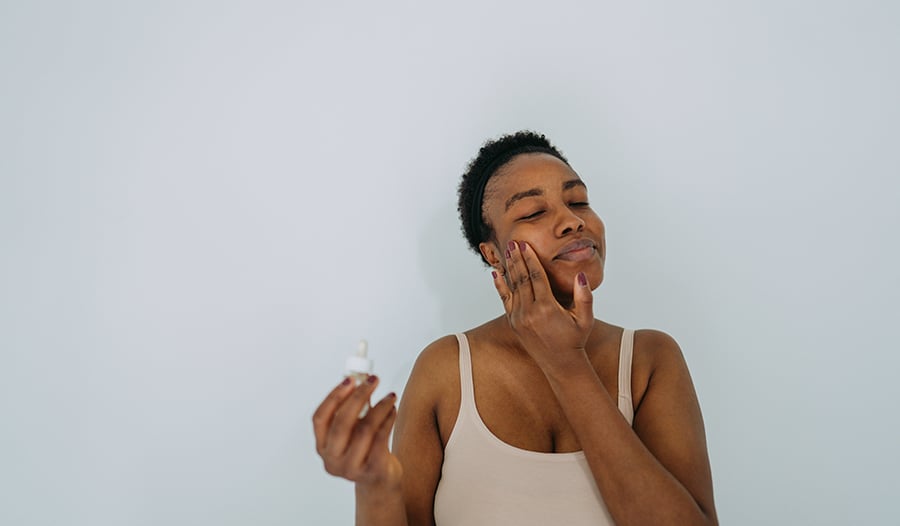Niacinamide’s Powerful Skin Benefits: Acne, Aging, Eczema, and More
DISCLAIMER:This blog does not intend to provide diagnosis...
- In this article:
- What Is Niacinamide?
- Niacinamide and Acne
- Niacinamide, Eczema, and Psoriasis
- Niacinamide and Anti Aging Skin
- Takeaway

Everyone wants beautiful, healthy, and youthful skin. Unfortunately, due to the effects of aging and environmental factors like sun damage, it becomes increasingly hard to keep the skin supple and firm.
While many cosmetics may focus on hiding or covering up skin damage, many more emphasize improving skin health through niacinamide. Niacinamide may be an amazing and natural solution to help improve the overall appearance and integrity of the skin.
What Is Niacinamide?
Niacinamide, also known as nicotinamide, is a form of vitamin B3 or niacin. Niacin is a necessary vitamin for overall health with a unique emphasis on skin, gut, and nervous system health. It also is a necessary vitamin for the production of energy and metabolism.
Long-term niacin deficiency can have detrimental effects on overall health. Chronic niacin deficiency may result in a disease called pellagra. Signs and symptoms of pellagra include dermatitis, skin inflammation, diarrhea, and mental disturbances. Some of the mental disturbances include confusion, depression, and even psychosis. If not corrected with vitamin B3 supplementation, then pellagra can be fatal.
Niacin can be converted into niacinamide. This occurs in the body when niacinamide is metabolized from niacin. Niacin can be ingested through green vegetables, beef, and chicken. It can also be made from the amino acid tryptophan in the liver or taken as a dietary supplement. Once niacin enters the body, it can be converted into niacinamide in the gut.
Niacinamide can then become a component of a molecule called nicotinamide adenine dinucleotide (NAD). NAD is a coenzyme found throughout every cell in the body and is crucial for energy metabolism.
While many think of niacin for its ability to prevent pellagra, its effects on energy production, and even the potential to lower cholesterol, niacinamide, is known for a different reason: its potential to positively affect skin health.
Although higher doses of niacin are linked to skin flushing and itchiness, niacinamide isn’t linked to these unpleasant side effects. This serves as an ideal agent for cosmetics. Niacinamide is often included in many cosmetics for the skin precisely due to its potentially beneficial effects and relative lack of uncomfortable side effects. Research suggests that niacinamide may have fantastic skin benefits, including reducing acne, improving eczema and psoriasis, and protecting against skin aging.
Niacinamide and Acne
Studies indicate that one of the biggest culprits contributing to acne is microbes like bacteria. Bacteria like Propionibacterium acnes have been linked to acne by increasing sebum, forming comedones, and increasing inflammation.
Sebum is an oily-like substance produced by the skin. Its purpose is to help keep the skin moisturized, but excess sebum production is linked to acne formation. One review study found that a topical application of niacinamide helped decrease sebum levels. Additionally, research suggests that topical niacinamide helps protect the skin's natural barrier and may even help to prevent the growth of P. acnes bacteria.
A study involving 198 patients with acne had participants take an oral formulation of niacinamide, zinc, copper, and folic acid. This study followed patients for eight weeks to measure if the number of inflammatory lesions on the skin decreased.
After a 4-week period, 79% of participants reported an improvement in their appearance, and 55% reported a moderate to a significant reduction in the number of inflammatory lesions.
Another review study highlighting results from several randomized controlled trials found that topical application of niacinamide was comparable to topical antibiotics, such as erythromycin and clindamycin, in reducing acne lesions and seborrheic dermatitis, which is commonly known as dandruff.
Studies also suggest that niacinamide works with antibacterials to reduce acne lesions. One double-blind, randomized, placebo-controlled study involving 140 participants ranging from ages 12 to 50 assessed the efficacy of a topical agent containing niacinamide, zinc, and an antibacterial against a placebo to reduce moderate acne. The study found a significant decrease in noninflammatory acne lesions by the second week of topical application of the niacinamide-containing cream against the placebo group.
Not only may niacinamide be helpful for acne, it may also be beneficial for other skin conditions like eczema and psoriasis.
Niacinamide, Eczema, and Psoriasis
Eczema is a chronic skin condition causing dry, itchy, cracked, and thickened skin. Eczema often causes a rash of raised lesions, bumps, and flaking on the skin. Eczema can appear in many different body areas, but it usually affects places like the back of the knees and inside the elbows. Psoriasis is also a skin condition causing dry, raised, itchy, and scaly patches on the skin. These lesions usually appear on the scalp, knees, or elbows. Both eczema and psoriasis are linked to an increase in inflammation.
Research indicates that niacinamide may help to improve the appearance of eczema and psoriasis. One study involved 43 participants with dry, itchy, inflamed skin who had already used an emollient for their skin condition. The study had participants use a niacinamide-containing gel for 2 weeks, either on its own or as an adjunct to their other skin therapies.
The study found that almost all participants reported positive changes in the appearance of their skin and less need to use steroid-based skin creams.
An animal study involving eczema and a topical formulation of niacinamide found a significant reduction in inflammation and mature corneocytes, cells that form the outermost layer of the skin. In conditions such as eczema, these cells often replicate more quickly than normal, causing thickened skin and itching.
Another animal study found that niacinamide, in conjunction with methotrexate, worked better than methotrexate alone in reducing skin lesions and thickness commonly found in psoriasis.
A human study involved 60 participants between 18 and 65 who suffered from mild to moderate psoriasis. Participants used a niacinamide-based cream topically twice a day for 12 weeks. While some patients reported side effects like burning or itching, most individuals reported a positive change in the appearance of their lesions.
Studies suggest that in addition to helping to improve skin conditions such as eczema and psoriasis, niacinamide may also help prevent skin aging.
Niacinamide and Anti Aging Skin
Research indicates that niacinamide may also protect against ultraviolet (UV) radiation. This may help act as an anti-aging agent for the skin.
One randomized controlled trial was done using niacinamide on patients with actinic keratosis. Actinic keratosis is a skin disorder involving dry, scaly patches of skin caused by excessive UV radiation, like that which comes from too much sun exposure.
Actinic keratosis is precancerous and can develop into cancer called squamous cell carcinoma.
The double-blind, randomized, placebo-controlled trial involved patients who had four or more actinic keratosis lesions who either took oral niacinamide or a placebo.
After four months, the study found that oral administration of niacinamide resulted in a significant reduction in the development of new actinic kerotosis lesions against placebo.
Studies also suggest that niacinamide protects skin against UV radiation by maintaining adenosine triphosphate levels in skin cells and supporting deoxyribonucleic acid repair.
Niacinamide may also help protect against UV-induced suppression of the immune system, which contributes to the development of precancerous skin lesions. In addition, niacinamide plays a potential role in improving overall skin appearance. One open-label study involving a topical product containing ingredients like retinol, resveratrol, and niacinamide followed participants for ten weeks. This study found that topical application improved fine lines, wrinkles, smoothness, and skin brightness.
Another study involving 50 female participants with signs of aging skin like fine lines, uneven texture, and hyperpigmentation, followed them for 12 weeks as they applied topical niacinamide to only one half of the face. The participants applied a placebo cream to the other half of their faces. The study found that half of the face that had niacinamide application had a reduction in fine lines, blotchiness, yellowing of the skin, and hyperpigmentation, or dark patches. The study also found a marked improvement in the skin's elasticity.
Studies suggest that niacinamide helps decrease skin aging by reducing free radical damage and inflammation in the skin. Niacinamide may help improve hyperpigmentation by inhibiting melanosomes, organelles that produce melanin or the pigment that produces eye and skin color, from transferring into skin cells.
Takeaway
Niacinamide is an amazing supplement that may promote the health and longevity of skin by helping to make it supple, smooth, radiant, and beautiful. It may not only help to improve the appearance of the skin by reducing acne and improving dry inflammatory skin conditions, but it may also help protect against sun-induced skin damage. In short, niacinamide may be a natural and beneficial addition to any skincare health routine for lifelong healthy, radiant skin.
References:
- Bissett DL, Oblong JE, Berge CA. Niacinamide: A B vitamin that improves aging facial skin appearance. Dermatol Surg. 2005;31(7 Pt 2):860-865. doi:10.1111/j.1524-4725.2005.31732 (skin appearance improved)
- Boo YC. Mechanistic basis and clinical evidence for the applications of nicotinamide (niacinamide) to control skin aging and pigmentation. Antioxidants (Basel). 2021;10(8):1315. Published 2021 Aug 21. doi:10.3390/antiox10081315 (oxidative stress)
- Clayton RW, Göbel K, Niessen CM, Paus R, van Steensel MAM, Lim X. Homeostasis of the sebaceous gland and mechanisms of acne pathogenesis. Br J Dermatol. 2019;181(4):677-690. doi:10.1111/bjd.17981 (excess sebum linked to acne)
- Djokic-Gallagher J, Rosher P, Hart V, Walker J. Steroid-sparing effects and acceptability of a new skin gel containing the anti-inflammatory medicinal substance-nicotinamide. Clin Cosmet Investig Dermatol. 2019;12:545-552. Published 2019 Aug 2. doi:10.2147/CCID.S210444
- El-Khalawany M, Nouh AH, Kadah AS, Elsheikh M, Said M. Evaluation of safety and efficacy of topical 4% nicotinamide in treatment of psoriasis; among a representative sample of Egyptians (an analytical observational study). Dermatol Ther. 2022;35(9):e15734. doi:10.1111/dth.15734
- Farris P, Zeichner J, Berson D. Efficacy and tolerability of a skin brightening/anti-aging cosmeceutical containing retinol 0.5%, niacinamide, hexylresorcinol, and Resveratrol. J Drugs Dermatol. 2016;15(7):863-868. (Skin appearance improved)
- Forbat E, Al-Niaimi F, Ali FR. Use of nicotinamide in dermatology. Clin Exp Dermatol. 2017;42(2):137-144. doi:10.1111/ced.13021
- Hakozaki T, Minwalla L, Zhuang J, et al. The effect of niacinamide on reducing cutaneous pigmentation and suppression of melanosome transfer. Br J Dermatol. 2002;147(1):20-31. doi:10.1046/j.1365-2133.2002.04834.x
- Lauffer F, Jargosch M, Baghin V, et al. IL-17C amplifies epithelial inflammation in human psoriasis and atopic eczema. J Eur Acad Dermatol Venereol. 2020;34(4):800-809. doi:10.1111/jdv.16126
- Le Lamer M, Pellerin L, Reynier M, et al. Defects of corneocyte structural proteins and epidermal barrier in atopic dermatitis. Biol Chem. 2015;396(11):1163-1179. doi:10.1515/hsz-2015-0141
- Madaan P, Sikka P, Malik DS. Cosmeceutical aptitudes of niacinamide: a review. Recent Adv Antiinfect Drug Discov. 2021;16(3):196-208. doi:10.2174/2772434416666211129105629
- Marques E, Chen TM. Actinic keratosis. In: StatPearls. Treasure Island (FL): StatPearls Publishing; May 9, 2022.
- Nazarali S, Kuzel P. Vitamin B derivative (nicotinamide)appears to reduce skin cancer risk. Skin Therapy Lett. 2017;22(5):1-4.
- Niren NM, Torok HM. The Nicomide Improvement in Clinical Outcomes Study (NICOS): results of an 8-week trial. Cutis. 2006;77(1 suppl):17-28.
- Rolfe HM. A review of nicotinamide: treatment of skin diseases and potential side effects. J Cosmet Dermatol. 2014;13(4):324-328. doi:10.1111/jocd.12119
- El-Menshawe SF, Sayed OM, Abou-Taleb HA, El Tellawy N, Skin permeation enhancement of nicotinamide through using fluidization and deformability of positively charged ethosomal vesicles: a new approach for treatment of atopic eczema. J Drug Deliv Sci Technol. 2019;52:6878-701. doi:10.1016/j.jddst.2019.05.038
- Sitohang IBS, Yahya YF, Simanungkalit R, Adi Winarni DR, Madjid A. Efficacy and tolerability of topical nicotinamide plus antibacterial adhesive agents and zinc-pyrrolidone carboxylic acid versus placebo as an adjuvant treatment for moderate acne vulgaris in Indonesia: a multicenter, double-blind, randomized, controlled trial. J Clin Aesthet Dermatol. 2020;13(7):27-31.
- Snaidr VA, Damian DL, Halliday GM. Nicotinamide for photoprotection and skin cancer chemoprevention: A review of efficacy and safety. Exp Dermatol. 2019;28(1 suppl):15-22. doi:10.1111/exd.13819
- Walocko FM, Eber AE, Keri JE, Al-Harbi MA, Nouri K. The role of nicotinamide in acne treatment. Dermatol Ther. 2017;30(5):10.1111/dth.12481. doi:10.1111/dth.12481
- Xu H, Li H. Acne, the Skin Microbiome, and Antibiotic Treatment. Am J Clin Dermatol. 2019;20(3):335-344. doi:10.1007/s40257-018-00417-3
- Yang X, Tang Y, Wang M, et al. Co-delivery of methotrexate and nicotinamide by cerosomes for topical psoriasis treatment with enhanced efficacy. Int J Pharm. 2021;605:120826. doi:10.1016/j.ijpharm.2021.120826

 By Dr. Candace Mathers, N.D.
By Dr. Candace Mathers, N.D.


